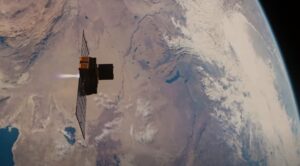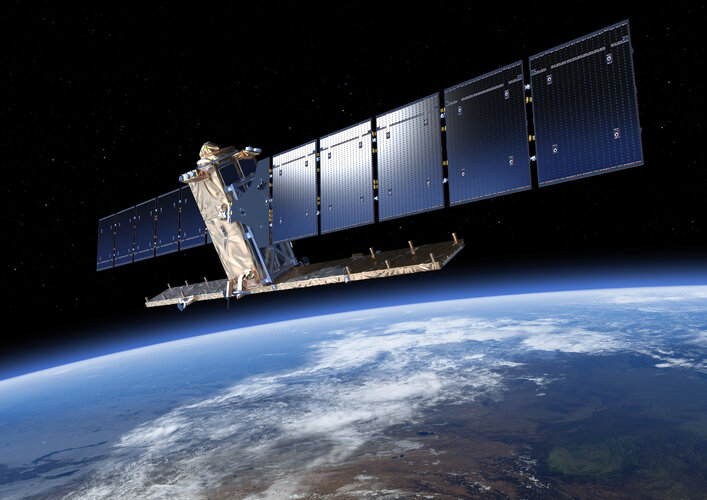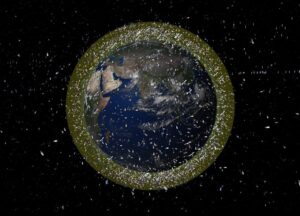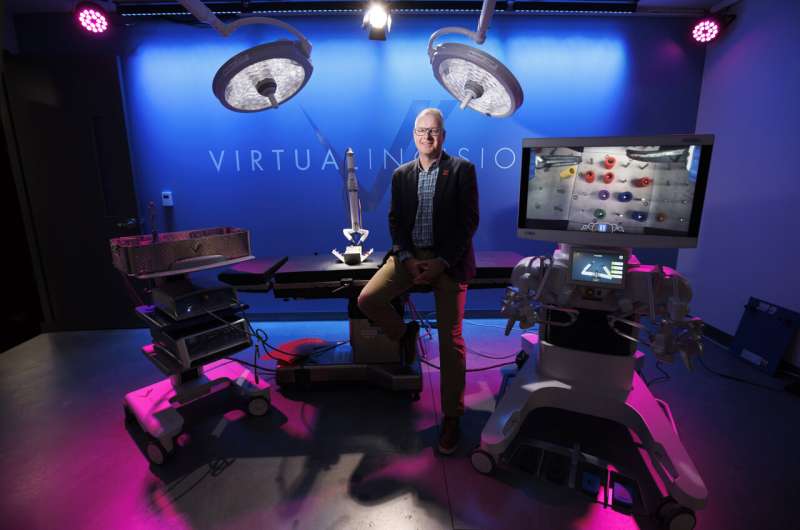Sidus Space selects AWS for LizzieSat constellation
Wednesday, 03 August 2022 10:47 Sidus Space, Inc. (NASDAQ:SIDU), a Space-as-a-Service satellite company focused on commercial satellite design, manufacture, launch, and data collection is pleased to announce its selection of Amazon Web Services, Inc (AWS) to provide cloud storage of mission critical Satellite-as-a-Service operation and customer data for the upcoming LizzieSat Constellation.
The primary mission of LizzieS
Sidus Space, Inc. (NASDAQ:SIDU), a Space-as-a-Service satellite company focused on commercial satellite design, manufacture, launch, and data collection is pleased to announce its selection of Amazon Web Services, Inc (AWS) to provide cloud storage of mission critical Satellite-as-a-Service operation and customer data for the upcoming LizzieSat Constellation.
The primary mission of LizzieS Momentus First Demonstration Mission Status Update #4
Wednesday, 03 August 2022 10:47 Momentus Inc. (NASDAQ: MNTS), a U.S. commercial space company that plans to offer transportation and other in-space infrastructure services, today provided its fourth Mission Update on its inaugural Vigoride mission that launched on May 25. Since the Company's last update on June 29, Momentus has successfully deployed four additional customer satellites.
Momentus initially deployed two cus
Momentus Inc. (NASDAQ: MNTS), a U.S. commercial space company that plans to offer transportation and other in-space infrastructure services, today provided its fourth Mission Update on its inaugural Vigoride mission that launched on May 25. Since the Company's last update on June 29, Momentus has successfully deployed four additional customer satellites.
Momentus initially deployed two cus Images of EDL Debris
Wednesday, 03 August 2022 10:47 When Perseverance landed on Mars on February 18, 2021 the entry, descent, and landing (EDL) hardware was discarded onto the surface at a safe distance away from the rover.
Some of that EDL hardware was later imaged by Perseverance and Ingenuity. For example on Sol 414 (April 19, 2022), the Ingenuity helicopter returned a detailed color image of the discarded parachute and backshell located
When Perseverance landed on Mars on February 18, 2021 the entry, descent, and landing (EDL) hardware was discarded onto the surface at a safe distance away from the rover.
Some of that EDL hardware was later imaged by Perseverance and Ingenuity. For example on Sol 414 (April 19, 2022), the Ingenuity helicopter returned a detailed color image of the discarded parachute and backshell located ESA names first 'astronaut' to fly on the Artemis I lunar mission
Wednesday, 03 August 2022 10:47 The specially trained woolly astronaut, Shaun the Sheep, has been assigned a seat on the Artemis I mission to the Moon, it was announced today.
Shaun's assignment was announced by ESA's Director for Human and Robotic Exploration Dr David Parker.
David Parker said, "Shaun's mission assignment rounds off the first phase for the latest members of our astronaut corps, with Italian ESA as
The specially trained woolly astronaut, Shaun the Sheep, has been assigned a seat on the Artemis I mission to the Moon, it was announced today.
Shaun's assignment was announced by ESA's Director for Human and Robotic Exploration Dr David Parker.
David Parker said, "Shaun's mission assignment rounds off the first phase for the latest members of our astronaut corps, with Italian ESA as Earth spun faster June 29, causing shortest day since 1960s
Wednesday, 03 August 2022 10:47 The Earth spun faster around its axis on June 29, making it the shortest day since the planet's rotation began being measured with atomic clocks in the 1960s.
Earth completed one spin in 1.59 milliseconds shy of the typical 24 hours on June 29, according to Time and Date and The Guardian. The record comes as Earth has seen consistently shorter days in the past few years.
Earth's
The Earth spun faster around its axis on June 29, making it the shortest day since the planet's rotation began being measured with atomic clocks in the 1960s.
Earth completed one spin in 1.59 milliseconds shy of the typical 24 hours on June 29, according to Time and Date and The Guardian. The record comes as Earth has seen consistently shorter days in the past few years.
Earth's Momentus deploys additional satellites from Vigoride tug
Wednesday, 03 August 2022 09:49
Momentus has deployed additional satellites from its first space tug that encountered technical problems shortly after its launch in May and is moving forward with a second launch later this year.
Mission ends for Copernicus Sentinel-1B satellite
Wednesday, 03 August 2022 08:00
On 23 December 2021, Copernicus Sentinel-1B experienced an anomaly related to the instrument electronics power supply provided by the satellite platform, leaving it unable to deliver radar data. Since then spacecraft operators and engineers have been working tirelessly to rectify the issue. Unfortunately, despite all concerted efforts, ESA and the European Commission announce that it is the end of the mission for Sentinel-1B. Copernicus Sentinel-1A remains fully operational and plans are in force to launch Sentinel-1C as soon as possible.
RS-25 delays impact Aerojet earnings
Wednesday, 03 August 2022 01:09
Delays in starting production of RS-25 engines for NASA affected Aerojet Rocketdyne’s earnings in the second quarter, but the company expects to catch up on the program later this year.
The post RS-25 delays impact Aerojet earnings appeared first on SpaceNews.
Biden to sign chips bill in a boost for satellite supply chains
Tuesday, 02 August 2022 21:48
A bill that would give $52 billion in subsidies to U.S. chip makers promises to galvanize domestic production, although it will take time to alleviate a semiconductor shortage that has been delaying satellite projects.
Report: U.S. should push for global rules on space traffic management
Tuesday, 02 August 2022 16:27
It's unclear how much longer industries and governments can continue to operate safely in space without globally coordinated traffic management, says a new report from the Atlantic Council
The post Report: U.S. should push for global rules on space traffic management appeared first on SpaceNews.
Webb telescope captures colorful Cartwheel Galaxy
Tuesday, 02 August 2022 16:17
Webb captures stellar gymnastics in the Cartwheel Galaxy
Tuesday, 02 August 2022 13:00
The Cartwheel Galaxy, a rare ring galaxy once shrouded in dust and mystery, has been unveiled by the imaging capabilities of the NASA/ESA/CSA James Webb Space Telescope. The galaxy, which formed as a result of a collision between a large spiral galaxy and another smaller galaxy, not only retained a lot of its spiral character, but has also experienced massive changes throughout its structure. Webb’s high-precision instruments resolved individual stars and star-forming regions within the Cartwheel, and revealed the behaviour of the black hole within its galactic centre. These new details provide a renewed understanding of a
Hyundai partners with research institutes to develop vehicle for lunar surface exploration
Tuesday, 02 August 2022 12:21
The Korean carmaker and its sister company Kia Motors formed a consortium July 27 with six state-funded research institutes here to explore the concept of lunar exploration mobility and core technologies required.
The post Hyundai partners with research institutes to develop vehicle for lunar surface exploration appeared first on SpaceNews.
Remote surgery robot to be tested aboard International Space Station
Tuesday, 02 August 2022 12:00
A miniaturized robot invented by Nebraska Engineering Professor Shane Farritor may soon blast into space to test its skills.
NASA recently awarded the University of Nebraska-Lincoln $100,000 through the Established Program to Stimulate Competitive Research (EPSCoR) at the University of Nebraska Omaha to ready the surgical robot for a 2024 test mission aboard the International Space Station.
"NASA has been a long-term supporter of this research and, as a culmination of that effort, our robot will have a chance to fly on the International Space Station," Farritor said.
Farritor is co-founder of Virtual Incision, a startup company based on Nebraska Innovation Campus. For nearly 20 years, he and his colleagues have been developing the tiny surgical robot known as MIRA, short for "miniaturized in vivo robotic assistant.
Unveiling the distribution of dark matter around galaxies 12B years
Tuesday, 02 August 2022 11:32 A collaboration led by scientists at Nagoya University in Japan has investigated the nature of dark matter surrounding galaxies seen as they were 12 billion years ago, billions of years further back in time than ever before. Their findings, published in Physical Review Letters, offer the tantalizing possibility that the fundamental rules of cosmology may differ when examining the early history o
A collaboration led by scientists at Nagoya University in Japan has investigated the nature of dark matter surrounding galaxies seen as they were 12 billion years ago, billions of years further back in time than ever before. Their findings, published in Physical Review Letters, offer the tantalizing possibility that the fundamental rules of cosmology may differ when examining the early history o 
